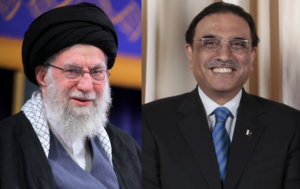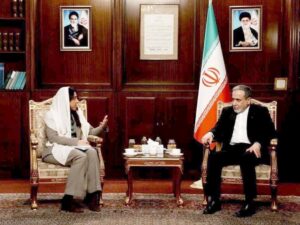Iran’s VP Sheena Ansari Calls for Protecting Environment Amid Global Conflicts to Ensure Lasting Peace

Tehran, The Gulf Observer: Iran’s Vice President and Head of the Department of Environment, Sheena Ansari, emphasized the urgent need to safeguard the environment amid global conflicts, highlighting that wars are destroying nature and undermining the foundation for lasting peace. Her remarks were delivered in a speech read at the international seminar “Shadow of War on People and Nature in the Region” held in Tehran on Sunday, marking the International Day for Preventing the Exploitation of the Environment in War and Armed Conflict.
Vice President Ansari, who was unable to attend the seminar in person due to ongoing wildfires in Chalus in northern Iran, stressed that environmental protection is inseparable from sustainable peace. “We must deeply understand that the future of peace and the future of humanity depend on the future of the environment. If nature is destroyed, sustainable peace will not endure,” she said.
In her full address, Ansari highlighted that wars not only reshape political boundaries but also devastate ecosystems, destroy forests and rivers, and compromise nature’s regenerative capacity. She noted that while infrastructure can be rebuilt, restoring burned forests or dried wetlands may take decades or be impossible.
Ansari further underscored the compounded threats posed by climate change, water scarcity, and biodiversity loss, noting that conflicts exacerbate these crises. She pointed to military aggressions in Gaza, which have caused both human tragedies and severe environmental damage, contaminating water and soil and disrupting the region’s ecosystem.
Domestically, Iran has also faced environmental losses due to conflicts, with approximately 20,000 hectares of forests and rangelands burned in recent attacks, releasing over 244,000 tons of carbon dioxide into the atmosphere.
To address these challenges, Ansari outlined the Environmental Protection Organization’s key initiatives, including:
- Protecting water resources and preventing toxic leaks,
- Establishing mechanisms for environmental crisis management,
- Ecological restoration programs,
- Scientific and legal documentation of war-related environmental damage.
She stressed that these measures elevate the organization’s role from supervision to active participation in national and regional security and environmental protection.
“Peace is not merely the absence of war; peace is the presence of a healthy environment, a healthy society, and healthy human beings,” Ansari concluded, urging policymakers, researchers, and specialists to prevent the environment from becoming the silent victim of conflicts and to ensure its protection for future generations.


